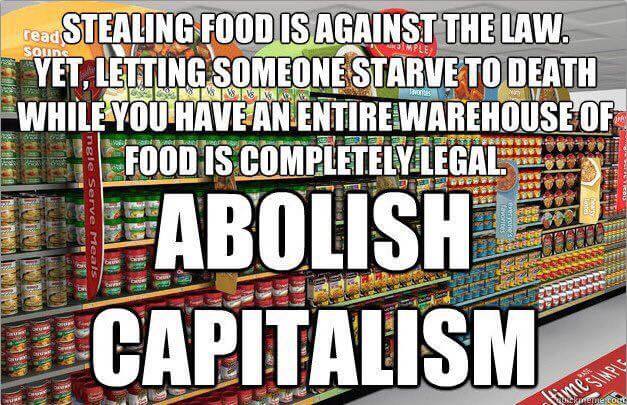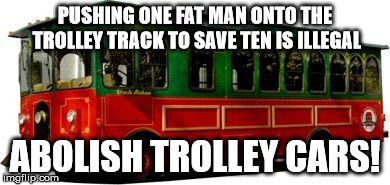Scott Alexander has an article at Slate Star Codex discussing the use of edge cases in moral philosophy:
There’s a tradition at least as old as Kant of investigating philosophical dilemmas by appealing to our intuitions about extreme cases. Kant, remember, proposed that it was always wrong to lie. A contemporary of his, Benjamin Constant, made the following objection: suppose a murderer is at the door and wants to know where your friend is so he can murder her. If you say nothing, the murderer will get angry and kill you; if you tell the truth he will find and kill your friend; if you lie, he will go on a wild goose chase and give you time to call the police. Lying doesn’t sound so immoral now, does it?
This is a great way of doing philosophy, but reading it, I realized I had heard it before. I’ve heard this sort of argument in the context of policy debates.
Here’s a particularly striking example (h/t to Jason Brennan):
Unlike the case of the door-to-door murderer, which is a deliberately fanciful way of examining a broader moral truth, this is a policy proposal made on the basis of a fanciful scenario. The argumentation goes like this:
- In an unlikely scenario, economic system A would allow bad outcome X
- Therefore, abolish A (and substitute it with another system, such as B)
There are a lot of errors packed into this line of thinking. What if bad outcome X happens under both systems? What if changing systems just substitutes bad outcome Y for X? What this fails to do is compare the relevant alternatives. Is the implicit claim that under socialism, nobody would ever starve? Millions of Soviet citizens beg to differ.
Here’s one I made in response:
The reasoning is essentially the same: I can think of an unlikely scenario in which a policy (illegal violence) would allow a terrible outcome to occur (the next Hitler). Is a future dictator walking around more fanciful than the scenario above? It’s hard to say.
In the first scenario, we have a person who can’t get the income to buy food, so his only recourse is to steal. This person can’t find a job despite the many opportunities present in a capitalist system. He can’t get charity or welfare (if it exists). And yet he is able-bodied and mentally sound enough to successfully break into a warehouse. Seems pretty unlikely. In the second, we have a young Hitler narrowly avoiding a sniper’s bullet.
Here are the questions we should ask ourselves: Would more people starve under capitalism or socialism? Would more people suffer violent deaths under legal random violence or under illegal random violence?
Under capitalism, assuming a pure free market with no welfare state and no private charity (!), people who didn’t have enough money would starve. However, capitalist incentives lead people to produce vast quantities of food and bring them to consumers at minimal cost. Where did you think the warehouses came from? If you can mow someone’s lawn for $5, you can buy five cans of beans, which will feed you for a few days in a stretch. If you can mow five lawns, you can eat much more than just beans.
Under socialism, the central authority needs to coordinate the entire production and distribution of food. This is no easy task. The Soviet Union suffered famines every decade or so. And even when there wasn’t a famine, store shelves wouldn’t have anything near the level of selection we enjoy under capitalism. Soviet officials were supposed to have fallen to their knees and wept upon entering ordinary American grocery stores. That Americans took for granted what their smartest planners spent half a century failing to achieve was a shocking revelation.
So do more people starve under capitalism or under socialism? Capitalism wins this one, unambiguously, in both theory and practice. Do more people die in a world where random shootings are legal? Clearly yes. And yet if we restrict our attention to a single fanciful scenario, we can come to the opposite conclusion. This is neither surprising nor relevant.
Applying the Argument to Socialized Medicine
The place where I find people are most prone to this sort of reasoning is medical care. “If Canada didn’t have socialized health care, people who got sick would get impoverished or die!” Well, no. Private insurance can insure people against idiosyncratic risks without socialization. “But what if some people don’t think to buy insurance and get sick?” Yes, that might happen. I could say that people should be responsible for managing their own lives, and buying health insurance is part of that. If that doesn’t satisfy you, I could say that loads of people feel just the way you do about people being ruined by illness, probably enough to crowd-fund treatments for such people without government intervention.
But if you must have a government solution, and it must yield absolute certainty that no uninsured person be ruined by an unexpected illness, then let the government create a bare-bones health insurance plan, the cost of which can be refunded to everyone who buys private insurance.
Socialization goes way beyond solving the “uninsured people might get sick and die” problem and creates a whole load of problems of its own. It involves the government haphazardly attempting to plan a whole industry, driving up costs through inefficiency and perverse incentives, and rationing care through wait lists.
When limes shot up in price last year, we had rationing. We rationed through prices. People who didn’t want to pay $2/lime didn’t buy limes. When a bunch of Canadians need to see specialists or get MRI scans (which is always), the rationing doesn’t happen through price but through waiting lists. We hear stories every day of people dying on wait lists or suffering from chronic pain for months awaiting surgery. These people would gladly have paid to get immediate treatment, and while their willingness to pay might mean bidding some medical resources away from others less willing to pay, it would also lead capitalist entrepreneurs to invest more resources in the medical sector. More medicine for all!
People want socialized medicine because they don’t want anyone to ever die because they can’t afford treatment. And yet people dying because their treatment was excessively delayed don’t get much attention. It’s hard to understand why. I suppose the former would kill the poor, while the latter is an equal-opportunity killer?
Consequentialism without Cost-Benefit Analysis?
But this whole discussion is wrong-headed in that we haven’t established just how many people would die from each of these causes under each of these systems! When we’re doing moral philosophy, it doesn’t mater if our scenarios actually come to pass. The trolley-car problem can tell us something interesting about our moral intuitions regardless of how often I tie people to trolley car tracks and force you to choose whether to flip a switch to kill some and not others (man, that was a crazy weekend). But the hypothetical uninsured person dying for lack of treatment tells us precisely nothing about policy unless we know just how many people are dying. Is it comparable to the number of people killed by buckets? Or is it more like the number of people killed in car accidents?
Without knowing, we can’t do any sort of cost-benefit analysis. But the original arguments (against capitalism and for socialized medicine) were couched in consequentialist terms. Consequentialism without cost-benefit analysis is incoherence.
I can’t help myself, so here’s one last meme:





